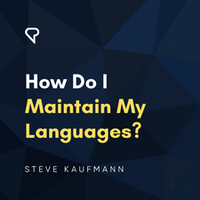How Do I Maintain My Languages?
Maintaining our languages.
Hey, Steve Kaufmann here and this evening, I'm going to talk
about maintaining our languages.
Now.
Uh, I often get asked the question, how do I maintain my languages?
You know, I learn so many languages, uh, more or less up to 21.
I don't know them all equally well, obviously.
Uh, how do I maintain them?
So that's what I'm going to talk about.
Uh, please subscribe to my channel if you like these videos, uh, click
on the bell to get notifications and please do come and join me at LingQ.
So the question I get often, I get asked very often is how
do I maintain my languages?
I guess the simple answer is that I don't, I don't really think about it.
I don't worry about it.
I know that I have, you know, lost a lot in languages, you know, my weaker
languages, you know, maybe the top 10 or 12, like I don't lose that much,
but, uh, you know, Romanian check Greek, Polish, Korean, you know,
uh, I've fallen off quite a bit.
Uh, this evening my wife was watching a movie on Netflix and it was in Polish.
So I thought I'd go and see what I could understand.
Very difficult.
Some bits of conversation I could pick up, especially if they were speaking sort
of more formally, uh, you know, there was a scene where this guy was talking
to a lawyer and there I can understand more of it, but when it's just the quick,
casual, back and forth, very difficult.
And certainly I'm nowhere near as good at, not that I ever was very good,
but nowhere near as good as I was.
So then the question...
and the same can be said, obviously for Romanian, speaking of Romanian
when I was in Romania, but now no way, uh, I noticed my Turkish is
falling off my Persian for sure.
Uh, Greek.
Okay.
So then the question is, well, why bother?
Why, you know, invest so much effort and time in learning these languages
when inevitably when you can't, you don't have enough time to, to maintain
them to, to continue to improve in them and they, they do decline.
Why bother?
So it suddenly dawned on me that every one of these languages that I
have, you know, put a lot of effort into, they're like an investment.
They're like a field somewhere that I have sewn, uh, with, with seed, you
know, and I kind of leave it there.
And any one of these, any of these investments or any of these, you
know, little treasures that I have, I can go there whenever I want
to, and kind of fertilize it and water it and bring it back to life.
And, you know, I know from experience that when I go back to a language that
I put a lot of effort into, then I don't start obviously at the beginning.
And in fact, as I go over some of the material that I did before I end
up very quickly, you know, further ahead and, and whatever we forget and
relearn in a way we learned it better.
And so to me, I have Polish there and one day I hope to have the
opportunity to go back to Polish and it might be before a trip to Poland.
But I've, I've planted that out there.
That's something that I have that's, that's, uh, you know,
an investment that I've made.
That's an asset that I have, and the same is true of Greek and
Romanian, any of these languages.
So I don't really worry about maintaining them so much.
It's rather a matter of if I feel I'm going to be able to use them and
enjoy them for a period of months or whatever, or in preparation for a trip.
Then I'll be able to go back to them.
And the fact that the casual encounter, if I run into someone who's Polish speaking,
or Czech speaking, or Greeks, speaking and I struggle and can't really say much.
Yeah.
That's unfortunately that's a consequence of learning so many languages, not
being able to maintain them all at sort of a, an immediately usable level.
But on the, on the positive side, these are assets that I have that I can go
back to whenever I need them or want to.
So I just thought of that in, in light of having, you know, watched this Polish
movie and realized how much my Polish has slipped, but not really feeling
badly about it because I still have that Polish that I can go back to.
So thank you for listening bye for now.
Oh, and I almost forgot on Tuesday at 10:00 AM pacific standard
time, Vancouver time, I'm having an Arabic language live stream.
So if you're interested, please come check the description box
for, you know, how to find it.
We're only gonna have it's all going to be in Arabic.
okay.
Bye-bye

